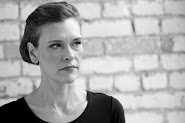I, too, had a great father, and now he is dead. He died in 1992, while I was still studying at University of Houston in the Ph.D.-turned-M.F.A. program in fiction. He was a chief ally in my writing, in endeavor itself. On one of our Saturdays he called and asked, "Do you know who Clarice Lispector is?" He had started riding the bus, tired of driving in from the suburbs and wanting the exercise of walking. He had befriended, while reading fiction by women authors on the bus, a man who was a translator of Clarice Lispector, who rode the bus to the U of Minnesota. Yes, I had heard of her; I had even taught her. I was thinking, Lispector is too little known for my father to be mentioning on the phone, and, even people at my school don't know much about her, yet here it is.
My father had traveled on business several times to South America and had taken Spanish before the trips in order to participate. He had brought back handmade souvenirs and currency from each country. Each time he travelled, we watched his plane take off and land. These are things I left out of my self-presentation in Houston. Rarely were the descriptions of people's fathers complicated. Each woman said it once, and everyone remembered it forever: "doctor," "movie producer," "came over on the Mayflower." I was quiet on the topics of the past probably because I had already written a novella based on childhood and thought I was done with that.
By the next summer (1991) I had been scouring for "guides," books that would let me categorize something I was writing myself. I wanted to know that what I was writing WAS categorizable, not that it wasn't, because I was having a breakdown writing it. I felt that just knowing that it belonged somewhere in a tradition would help me buck up (under the scrutiny of the class who had categorized my short stories as "experimental"). No one else was having a breakdown while attending. Later I heard that one woman had a breakdown (and went to the hospital) after the Illinois state Supreme Court had ruled against her for having used someone's real first name in one of her short stories and a man had had a novelist's breakdown during a fellowship year.
Years afterward, well out of it, I found, a little late, Lispector's CRONICAS, a collection of short "intimate" essays published in a major Brazilian newspaper, Jornal do Brazil (collected and translated decades later by New Directions). Perhaps what I wrote in the early 1990s was most like that, though I had written without an audience, and she had written for a huge audience, Saturday readers.
My father was a microbiologist who visited my fourth-grade class to teach the children about germs, about how germs collect on their fingers, even after they wash, and how these germs incubated in petri dishes and grown in augur sprout fungal clouds, each one a little different like fingerprints. He handed back the kids' germs in the petri dishes on a return visit (the dirtiest of the kids, the baddest of the boys, did not seem riled then by their overgrowths; they thought their germs were THE coolest because the MOST or the BIGGEST). For a prize, he gave each kid a bottle of Tame cream rinse that he had brought in a box from his company, the Gillette Company.
This is the type of memory I wonder about in considering autobiography now: If the children grown were to remember my father's visit to the school, would they remember it as a dirty trick or as a lesson: Germs are all around us, washing only does away with some of them, and some germs are even good or normal. Perhaps one of the kids in our grade even BECAME a microbiologist! He was not doing evil university research or stashing the kids' germs or itemizing them in any way. It was a lab science lesson before we were quite old enough to have lab science. He was inventing Fathers-in-the-Schools ...
Subscribe to:
Post Comments (Atom)













No comments:
Post a Comment